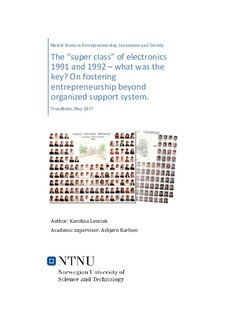| dc.description.abstract | The university gains constantly greater importance in the local and regional development policies. Apart from two traditional roles of university that is research and education, the third mission was added in recent decades – commercialization of science and technology by new firm formation. Although various institutionalized measures for fostering and supporting entrepreneurship were developed, like technology transfer offices, incubator, science parks, or formalized entrepreneurial education, the perfect formula for encouraging academic entrepreneurship has not yet been devised.
The main aim of this study was to investigate the distinctive case of technology entrepreneurs from classes of 1991 and 1992 of electronics at NTNU. The case combines 9 entrepreneurs who established 6 highly successful technology companies. Among the companies 3 were categorized as corporate spin-offs and 3 as university spin-offs. The case stands out due to the fact that in the period in question the institutionalized support system for entrepreneurship was non-existent, and no forms of encouragement towards firm formation were noted.
First research question asked in this study is concerned in the role that NTNU had in fostering entrepreneurial activities among the students in question. Through the case study it was argued that despite the lack of organized system for fostering commercial activities, NTNU indirectly influenced future entrepreneurs in several ways. Following factors were decisive for creating university environment that built the entrepreneurial base: state-of-the-art research; the close collaboration with industry; presence of entrepreneurial professors and example of entrepreneurial ventures within the faculty; and finally the conducive university culture that fostered innovative thinking.
The second part of the study was devoted to investigation why so many tech entrepreneurs spun off from the two classes at NTNU. It was argued that decisive for future entrepreneurs was job experience in the industry, that enabled individuals in question to acquire necessary skills and resources. For the entrepreneurs who commercialized their PhD research, of crucial importance was the connection with the industry that contributed to recognition of commercial potential. The impact had also the entrepreneurial example form other peers.
Through this case it is therefore argued that universities can foster entrepreneurship beyond organized forms through close cooperation with industry, and startups, and presence of academic entrepreneurs. | nb_NO |
